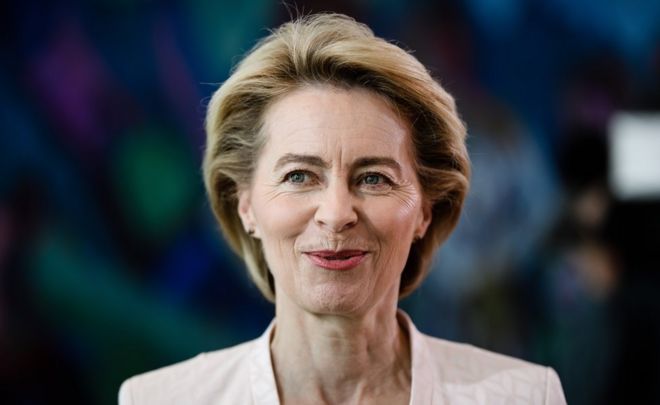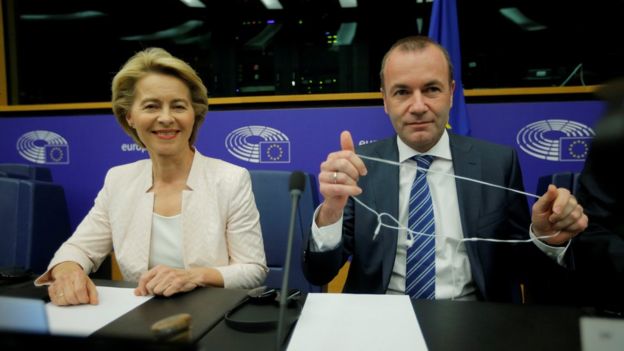"What was the point of all that?" German critics are asking, after the nomination of Ursula von der Leyen, Germany's defence minister, for the top EU job of Commission president.
 EPA
EPA
"What was the point of all that?" German critics are asking, after the nomination of Ursula von der Leyen, Germany's defence minister, for the top EU job of Commission president.
There were TV debates. There were election rallies. Germany's streets were plastered with posters showing the faces of candidates for the EU's top jobs.
But Mrs von der Leyen's face did not appear on any posters. Instead her nomination was suddenly announced after weeks of difficult, behind-the-scenes wrangling between EU leaders.
Their choice is being seen as a backroom deal - something the new, more personalised elections were supposed to prevent.
Why von der Leyen is unpopular at home
There is little patriotic fervour in Germany that, for the first time in 50 years, a German could become EU Commission president.
Ironically Mrs von der Leyen has more support outside her home country than within it.
 AFP
AFP
Abroad she is seen as a multi-lingual, pro-European political heavyweight, who has led three major ministries in the EU's biggest country and has a record pushing difficult pan-European defence projects.
But within Germany her reputation is more tarnished.

Once seen as a successor to Chancellor Angela Merkel, she has struggled as head of the defence ministry. It is a position renowned as a career-killer in Germany, so anything short of complete failure is a success of sorts.
- Who is Merkel ally von der Leyen?
- Italian chosen as European Parliament president
- German defence minister attacks own army
But she has been damaged by a string of almost farcical fiascos over useless equipment and an investigation into a procurement scandal and possible illegitimate use of external consultants.
Will minister's opponents block her?
Germany's powerful Green Party is threatening to veto the nomination in the European Parliament.
"It's an unparalleled act of political trickery," says Sigmar Gabriel, a big hitter in Germany's centre-left SPD and former party leader.
He called on his party, which governs Germany with Angela Merkel's centre-right party, to block the nomination.

Otherwise, he warned, the EU elections that were supposed to give the elected parliament more power in allocating top jobs risked becoming a farce.
Martin Schulz, former EU parliamentary president and Merkel rival, condemned what he called backroom haggling over top jobs.
Arguably Mr Schulz is more annoyed that his own backroom deals to get a fellow centre-left candidate into the job have backfired.
He has been outmanoeuvred once again by his nemesis, Angela Merkel.
 REUTERS
REUTERS
Her support for the original frontrunner, German conservative Manfred Weber, was only ever lukewarm.
She had been forced into supporting him by her conservative allies in Berlin. Mrs von der Leyen is, on the other hand a pragmatic centrist and a loyal Merkel ally.
There are rumours that moving Mrs von der Leyen to Brussels could help Angela Merkel promote her latest preferred successor, Annegret Kramp-Karrenbauer, by allowing her to step in as defence minister and boost her profile.
Ms Kramp-Karrenbauer has knocked back the idea.
She might be thinking that Ursula von der Leyen's career shows that being dubbed a Merkel successor and then taking on the difficult defence ministry is the fastest route out of German politics.
https://www.bbc.com/news/world-europe-48853746

